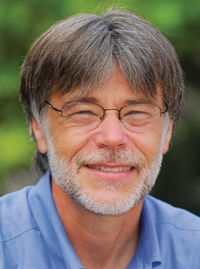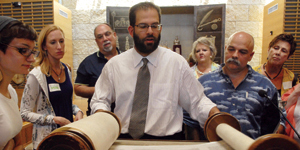Professors guide high school instructors on approaching Scripture as an academic subject
What is the latest event in Second Kings?”
No response. Professor L. Michael White, the Ronald Nelson Smith Chair in Classics and Christian Origins, had momentarily stumped 21 Texas high school teachers gathered in a second floor Waggener Hall classroom.
“You’re becoming biblical scholars,” White chided playfully. “You’d better know.”
The teachers began flipping the pages in their HarperCollins Study Bible and muttering hesitant guesses.
“The Babylonian exile,” someone called out.
White smiled. “That’s right.”
It was day two of a four-day crash course on how to teach the Bible in public schools, a training program crafted by University of Texas at Austin scholars to help teachers prepare for state-mandated classes on the Hebrew Scriptures and New Testament this fall. The university is the only state school in the country that provides such a program.
The August seminar was sponsored by the Religious Studies Department and the university’s Institute for the Study of Antiquities and Christian Origins in collaboration with the Atlanta-based Society of Biblical Literature.

“We’re the people who ought to be involved in this type of thing,” said Steve Friesen, the Louise Farmer Boyer Chair in Biblical Studies, who conceived of the program. “That’s why I like working at a state university. We have a different kind of connection to the people of Texas than a private institution would.” Friesen began laying the groundwork for this pilot program two years ago after the state legislature passed a bill requiring public high schools to teach students about the Bible and its influence on history, literature and culture either in elective courses or as part of social studies or English classes.
The legislation also promised teacher training and curriculum guidelines. The training never materialized, and the guidelines provided by the state gave teachers little direction, Friesen said. And with the law taking effect this fall, Friesen knew many teachers would be ill-equipped to teach the Bible.
With the backing of his department and assistance from two undergraduate religious studies students — Tyler Watts and Libby Sanders — Friesen began trying to whittle down what would ideally be a two-year course on the Bible into a four-day seminar. He collaborated with White, who directs the Institute for the Study of Antiquity and Christian Origins, and with the Society of Biblical Literature, which has developed its own program to assist teachers around the country.
Explanation of the Constitutional and legal guidelines that surround teaching the Bible in public schools was critical, he said. He also wanted to provide practical teaching strategies and ideas for lesson plans and syllabi. But ultimately the bulk of the course focused on the Bible as an academic subject.
“A lot of people in this part of the world at this point in history tend to have exposure to the Bible from a devotional perspective. … That’s one important way of dealing with the Bible, but it’s not what we do in a public school or university,” Friesen said. “The other thing we wanted to do was help sensitize the participants to differing opinions about the Bible and different religious communities.”
White and Kent Richards, executive director of the Society of Biblical Literature, led teachers on a fast-paced trek through the First Amendment, the Hebrew Bible and the Christian New Testament.
Toward the end of the second day, which included field trips to a synagogue and an Orthodox church, Pat Gillory’s head was spinning.
“We’ve been almost bombarded with so many ideas,” the English and writing teacher from the Woodlands said.
Gillory had taught the Bible at her church but never in a classroom and said she wanted to gain a broader perspective on Scripture. She described the four-day course as “amazing.”
“I cannot imagine what so many teachers in the state of Texas are doing because they don’t have this,” she said.
As the state’s flagship public university and the only one with a religious studies department, White said, The University of Texas at Austin was uniquely poised to fill the void.
“We have both the academic background and the perspective on doing it in a public context that allows us to say maybe we ought to run a pilot program,” White said.
The Religious Studies Department has expanded since its creation in 2007 and may soon offer graduate and doctoral degree programs. With some of the nation’s preeminent scholars on religion, the department is committed to serving as a resource to the public, Friesen said. It has also been certified by the Texas Education Agency to grant continuing education credits to teachers.
University scholars do not yet know whether they will sponsor another teacher training course on the Bible. Regardless of that decision, Friesen hopes faculty will continue to work with public school teachers on religious studies in general.
“I’m hoping these kinds of workshops will increase people’s curiosity, increase dialogue and discussions about these crucial issues,” he said.
The key, White said, is to ensure that teachers have the proper training and curricula and don’t become ensnared in First Amendment violations that expose the districts to litigation.
In 2007, the American Civil Liberties Union, on behalf of a group of parents, sued a West Texas school district for promoting a particular religious view through curriculum used in Bible classes.
The district used teaching materials from the National Council on Bible Curriculum in Public Schools, a North Carolina-based group that some parents said was sectarian. A settlement banned the district from using the National Council’s curriculum.
Even in a classroom with only Christian students, the subject matter can prove contentious, said Ken Darnell who has taught the Bible as a history course for five years in Whiteface, near Lubbock.
“You tread a few minefields,” he said, explaining that’s why he attended the seminar.
During the session held at Congregation Agudas Achim, Rabbi Neil Blumofe asked teachers to read aloud the 23rd Psalm. Then he sang it in Hebrew to convey the sound and inflection of the original language. The teachers listened, mesmerized.
Later at St. Elias Antiochian Orthodox Church near the state Capitol, they heard from the Rev. David Barr, who explained the differences between the Eastern and Western churches and their views of Scripture.
This was the lesson Friesen hoped teachers would take back to their schools.
“A lot of people in Texas come from a Christian-influenced culture,” Friesen said. “And it’s such a strong factor in Texas culture that we wanted to help people see that Christians disagree on how the Bible ought to be interpreted and Christians and Jews use some of the same texts in different ways. Hopefully that helps them understand the different students who are coming into their classes.”
